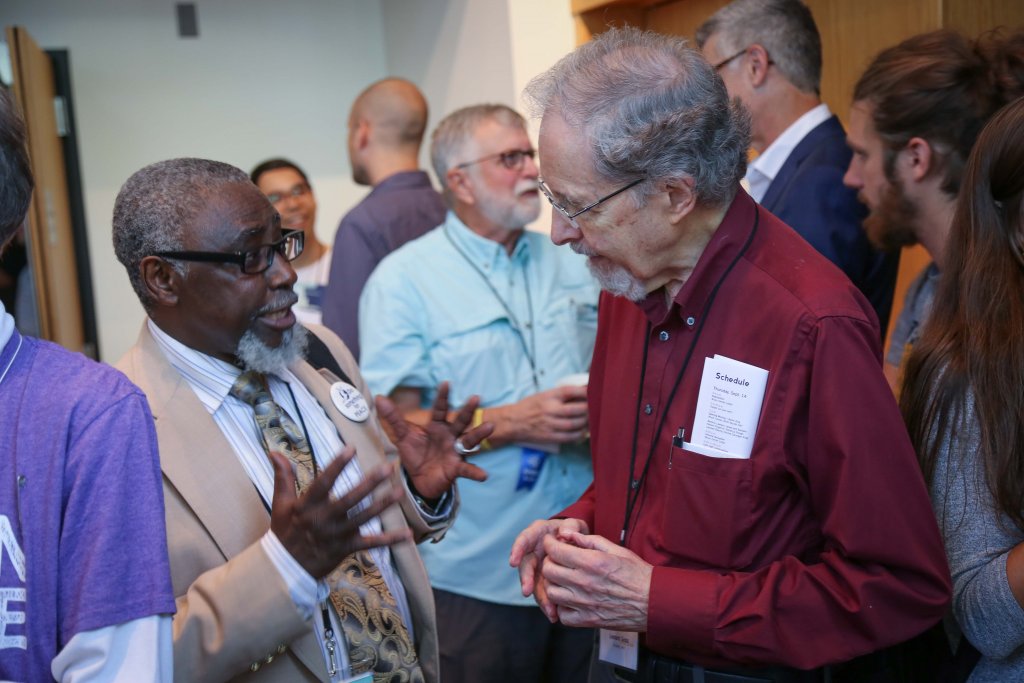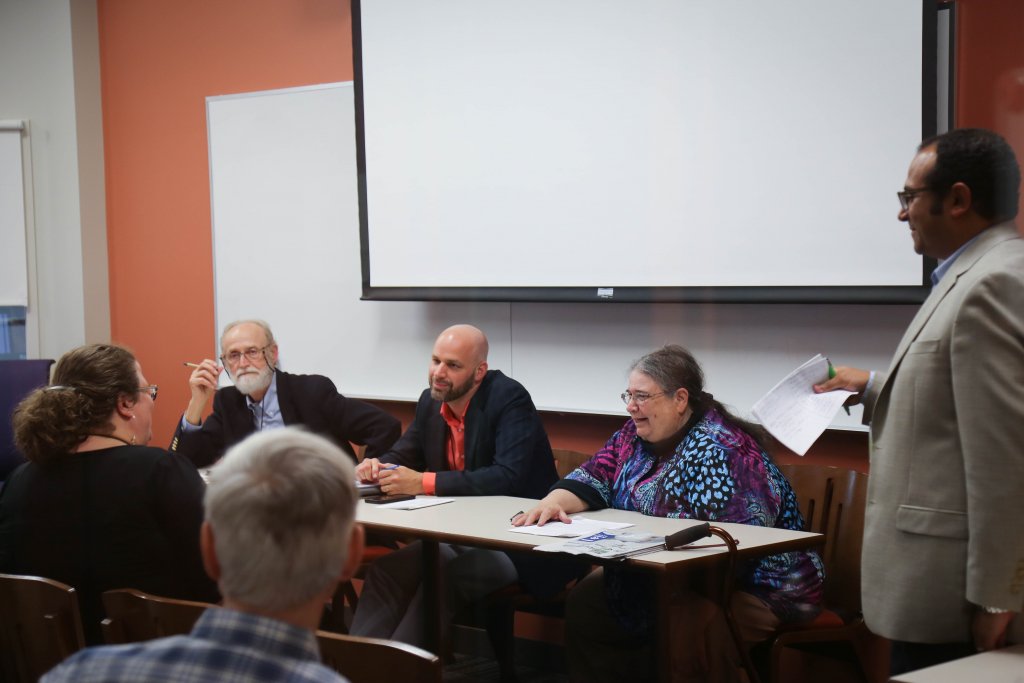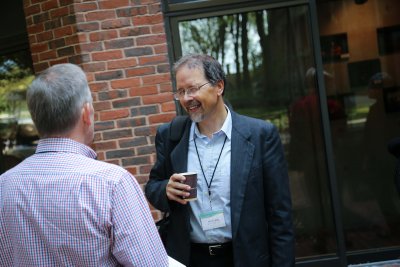150 gather for Believer’s Church Conference

Fifty years after the first Believers’ Church conference in 1967, more than 150 people representing nearly a dozen different denominational traditions gathered on the campus of Goshen (Ind.) College, September 14-16, to participate in “Word, Spirit, and the Renewal of the Church,” the 18th in the Believers’ Church conference series.
The conference, co-sponsored by Goshen College and the Anabaptist Mennonite Biblical Seminary, focused on the legacy of the Protestant Reformation for groups associated with the Anabaptist, or Radical Reformation, tradition. It also was an occasion for worship, wide-ranging conversations, and discussion regarding the usefulness of the term “Believers’ Church” and the future of the series.
The conference series takes its name from a gathering on “The Concept of the Believers’ Church” held in 1967 at the Southern Baptist Theological Seminary, Louisville, Kentucky. The following year Donald Durnbaugh, a Church of the Brethren historian and theologian, published The Believers’ Church: The History and Character of Radical Protestantism, which provided a broader rationale for the concept. In subsequent years, the Believers’ Church Conferences sought to bring together groups with direct or indirect ties to the Radical Reformation, who practiced voluntary, or believers, baptism.
Denominational families frequently associated within this tradition include: Baptists, Brethren in Christ, Church of the Brethren, Christian Church (Disciples of Christ), Churches of Christ, Churches of God, Friends, various Mennonite groups, Pentecostals, and others. The term is also known to many through the long-standing “Believers Church Bible Commentary” series, a cooperative project published by Herald Press.
The conference opened Thursday evening with a worship service of scripture and song that led participants on a biblical journey from creation, though desolation and despair, to the hope of a new creation.

In a plenary session on Friday morning, Joel Carpenter, director of the Nagel Institute for the Study of World Christianity at Calvin College, reminded listeners of the profound changes in the landscape of Christianity since the time of the Reformation. Carpenter highlighted especially the demographic explosion of Christianity in Asia, Africa and Latin America as well as the rapid growth of mission-oriented immigrant churches in North America. The challenge for those Christians whose identity is oriented to the Reformation, Carpenter argued, is to rethink basic assumptions about theology in light of the “gifts majority world Christians bring to the Christian faith.”

On Friday evening, Miroslav Volf, a renowned public theologian who teaches at Yale University Divinity School, challenged the audience to recover insights on humility and joy from the “young Luther.” The modern sense of Self, Volf argued, is based on a precarious notion of competition and self-achievement, on that encourages a sense of joyless inadequacy, failure, and depression. Luther’s understanding of humility, in which existence itself is recognized as a gift from God, enables the Christian to recover their true Self and to “rejoice with those who rejoice.” Volf’s lecture, part of the Yoder Public Affairs lectureship, drew an audience of nearly 400 people.
Panel sessions throughout the conference featured 75 papers focused on thematic topics such as “The Bible and the Reformation(s),” “The Holy Spirit in the Mission of the Church,” “Politics and Ethics,” and “Ecumenism and the Believers’ Churches Today.”
Conference participants also gathered for a plenary discussion on the future of the Believers Church Conference series. According to John D. Roth, one of the conference organizers, after regular gatherings between 1967 and 2008, the Believers Church Conference series had nearly died out. “One goal of this conference was to explore whether there was sufficient interest among this particular group of churches to move forward with additional conferences in the future.” At a plenary discussion session, participants openly acknowledged the limitations of the term “Believers’ Church,” but determined that it could continue to serve as a useful designation. The group also compiled a list of possible future conference themes, and set the next dates for 2019 (Washington, DC) and 2021 (Amsterdam).

The final two plenary speakers–Nancy Bedford, professor of applied theology at Garrett-Evangelical Theological Seminary, and Frank Thomas, professor of homiletics at Christian Theological Seminary—both opened their remarks with references to recent racial discord in St. Louis and Charlottesville. The Christian legacy of the Reformation, Bedford argued, has been hijacked in North America by “toxic whiteness,” which she described as “a self-destructive apostasy.” In this context, she asked, what parts of the Anabaptist tradition are good news today? “The agency of the Holy Spirit is absolutely essential,” Bedford said, “if we are to be transformed by the way of Jesus, whose narrow gate challenges the toxic forms of Christianity in the culture today, and opens into a wideness that embraces those who are most vulnerable.”
In a concluding worship service, Thomas, opened with a reference to Martin Luther King, Jr. and reminded listeners that moral and spiritual leadership “always has a cost.” Followers of Jesus, he continued, referencing Luke 9, never know what is going to be required. “If you are following Jesus, God is asking for your deepest ‘yes,’ even if it calls for more than what you think you are able to give.” The worship closed with a rendition of “I Have Decided to Follow Jesus.”
Sarah Ann Bixler, a student at Princeton Theological Seminary who organized a panel session on “Martyr Narratives in Anabaptist Faith Formation,” was one of numerous younger scholars attending the gathering. “As an emerging scholar,” she noted, “it was very meaningful for me to be part of the conference, to learn from a variety of Anabaptist perspectives and to have many fruitful conversations.”
A continuation committee led by William Brackney, professor Christian Theology and Ethics at Acadia Divinity College, will give leadership to the planning of the 2019 Believers Church Conference, currently scheduled to be hosted by African-American Baptist church leaders in the Washington, DC area.




